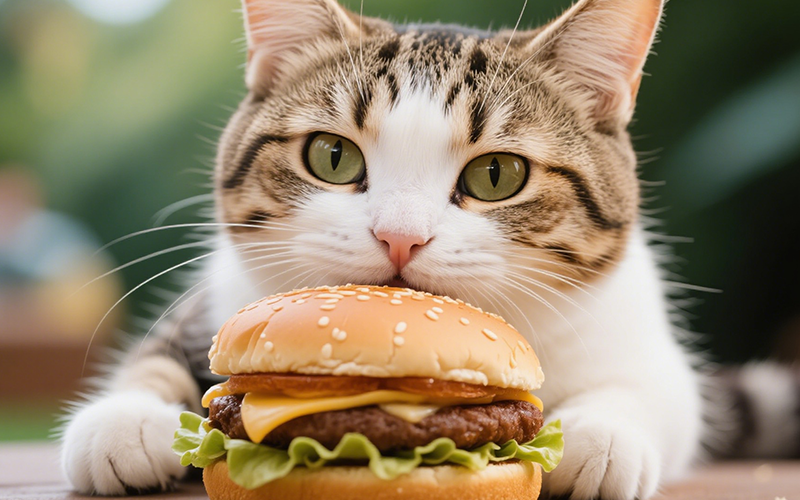Can Cats Eat Hamburger? A Meaty Treat or a Risky Snack?
- 7 Apr 2025 16:53
Hamburger is a popular food choice for humans, but when it comes to feeding your cat, the question remains: Can cats eat hamburger? The short answer is yes, cats can eat hamburger, but with some important precautions. Let’s dive into the details to understand whether this meaty treat is safe for your feline friend.

The Benefits of Hamburger for Cats
High in Protein: Hamburger is made from ground beef, which is a great source of protein, a key nutrient for cats. Cats are obligate carnivores, meaning they need protein from animal sources to maintain muscle mass, energy, and overall health. So, in moderation, hamburger can be a good source of protein for your cat.
Tasty and Appealing: Most cats love the taste of meat, and hamburger can serve as a tempting treat. It can be a great option for rewarding your cat or adding some variety to their diet (but only occasionally).
Potential Risks of Feeding Cats Hamburger
While hamburger is safe for cats in small amounts, there are several important factors to keep in mind:
Seasonings and Additives: The biggest concern with hamburger is seasonings. Many hamburgers are cooked with onions, garlic, salt, or other spices that are toxic to cats. Even a small amount of onion or garlic can cause serious health issues, including damage to red blood cells (leading to anemia). Always avoid giving your cat any hamburger that contains seasonings, sauces, or condiments.
Fat Content: Ground beef can be high in fat, especially if you’re serving regular or fatty cuts. Too much fat can lead to pancreatitis, a painful and dangerous condition for cats. High-fat foods also contribute to obesity if fed too often.
Risk of Overeating: Cats have small stomachs, and overeating any food, including hamburger, can lead to stomach upset, vomiting, and diarrhea. Additionally, too many calorie-dense foods like hamburger can contribute to weight gain over time, especially if your cat is already on a high-calorie diet.
Uncooked Hamburger: Raw hamburger should be avoided due to the risk of bacterial infections like E. coli or Salmonella. These infections can cause gastrointestinal distress, vomiting, and diarrhea. It’s important to always cook hamburger thoroughly to kill harmful bacteria before offering it to your cat.
How to Safely Feed Hamburger to Your Cat
If you want to share some hamburger with your cat, it’s important to do so safely:
Cook It Thoroughly: Always cook the hamburger meat thoroughly without any seasoning, oil, or butter. Serve it plain to avoid harmful additives.
Serve in Small Amounts: Limit the amount of hamburger you give to your cat. A small piece is enough as a treat. Remember, treats should only make up about 10% of your cat’s daily caloric intake.
Avoid Fatty Cuts: Opt for lean hamburger meat (like 90% lean or higher) to reduce the risk of excessive fat intake. Too much fat can cause digestive issues or lead to pancreatitis.
Watch for Reactions: After feeding your cat hamburger, observe them for any signs of digestive upset or allergic reactions. If you notice any unusual symptoms like vomiting or diarrhea, consult your vet.
Safer Alternatives to Hamburger
If you’re looking for other meaty treats to offer your cat, there are several options that are generally safer and more nutritious:
Cooked Chicken or Turkey: Lean, cooked poultry is a healthy, easily digestible treat for most cats.
Canned Tuna: In small amounts, canned tuna in water (not oil or brine) can be a tasty treat for cats.
Commercial Cat Treats: Specially formulated treats made for cats are always a safe option and can provide additional health benefits.
The Role of PettureX in Pet Health
If you’re ever unsure about what foods are safe for your cat, don’t hesitate to consult PettureX. PettureX offers 24-hour online consultations where you can ask about your cat’s diet and any specific foods they may want to try. You can also use PettureX’s pet image recognition tool to identify whether certain foods are safe for your feline companion.
Conclusion
So, can cats eat hamburger? Yes, but only if it’s cooked thoroughly, plain (without seasonings or additives), and served in small amounts. While hamburger can provide a good source of protein for cats, it’s important to watch for any signs of digestive upset or reactions to the fat content. Always ensure you’re offering it in moderation and as an occasional treat rather than a regular part of their diet.
If you have any concerns or questions about your cat’s diet, PettureX is a helpful resource for personalized advice and guidance! 🐱💚
Related

Frankly Dangerous: Can Cats Eat Hot Dogs? Vet Explains the Serious Risks
- 16 Apr 2025
A Purrfect Protein? Can Cats Eat Ground Turkey Safely? (Vet-Reviewed Guide)
- 16 Apr 2025
Gritty Situation: Can Cats Eat Grits Safely? Vet Explains the Risks
- 16 Apr 2025
Crunchy Query: Can Cats Eat Green Peppers? A Vet-Reviewed Safety Analysis
- 16 Apr 2025
Gravy Danger Zone: Can Cats Eat Gravy Safely? (Vet-Reviewed Warning)
- 16 Apr 2025
Toxic Temptation: Can Cats Eat Grapefruit? Vet Explains the Dangers
- 16 Apr 2025
Emergency Meal or Major Mistake? Can Cats Eat Dog Food For A Couple Days? (Vet Guide)
- 16 Apr 2025
Dandelions & Felines: Can Cats Eat These Common Weeds Safely? Vet Explains
- 16 Apr 2025
Flaky Danger: Can Cats Eat Croissants Safely? Vet Explains the Buttery Risks
- 16 Apr 2025
Hazard Alert: Can Cats Eat Corn Husks? Vet Explains Dangers of This Fibrous Material
- 16 Apr 2025
